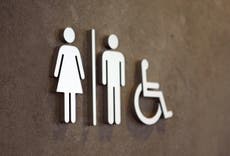Disabled people’s concerns have been pushed aside – nowhere greater is that failure than in British politics
As we lurch towards leaving the European Union, let us not forget its part in leading the development of the UK’s disability rights legislation

Over the past few years, the political agenda has been dominated by Brexit and the climate crisis; both incredibly important issues. But amid these dominating subjects, have the voices of disabled people been pushed aside?
In the recent election, many issues were discussed, but little was mentioned about those whose disability not only impacts their daily lives but may have affected their ability to vote.
Government data shows that there are 13.9 million disabled people in the UK, comprising a significant 22 per cent of the population – more than one in five. Those with hearing impairments suffer from additional challenges associated with communication, something that was raised by deaf voters during the recent elections when many political videos did not have subtitles.
“In a tight race, the messages you land to those who are deaf/hard-of-hearing might just be the difference. It's easy to do, `` said Hector Minto, inclusion advocate and Microsoft’s senior technology evangelist for accessibility. As someone who works to do that in my everyday job, I’m in full agreement.
I currently support a young woman who has a serious hearing impairment, so I FaceTime her British Sign Language translator who signs on her phone and then reverse routes back to me. I’m assisting her with her housing situation; she is a strong, hardworking woman who is brutally familiar with the discrimination that those who have disabilities face. I am also helping three other families who each have more than two children who are deaf; families who require support with housing and other important issues.
It is incredibly humbling to work with people who can find the strength to ignore ignorance and endless stares from others in their struggles to be included.
Even sign language poses problems, as British Sign Language (BSL) is different to English Sign Language. For example, Saleem, who is 24 and profoundly deaf is fluent in British Sign Language, but struggles with English because of the differences in grammar and vocabulary with BSL. He said, “I’m fluent in British Sign Language, but people don’t realise it’s different from English and things can be difficult for me to understand.”
As we lurch towards leaving the European Union let us not forget that the EU led the development of the UK’s disability rights legislation. In 1995, when the UK first introduced the Disability Discrimination Act (DDA), I was expecting my first child. At the time, I met a disabled expectant mother who was relieved that this new legislation could help her in her workplace because it covered transport, employment, education and other services.
But we must always read the small print with anything – the DDA protected companies with fewer than 20 employees if they discriminated against an employee based on disabilities. Which is why the Framework Directive for Equal Treatment in Employment and Occupation in 2000 was such a pioneering piece of EU law. It protected employees against direct and indirect discrimination and did not given protection for smaller businesses.
In 2004, the UK had to adapt the DDA legislation, giving stronger rights and a greater voice for people with disabilities. And, in 2015, the European Accessibility Act made sure that products and services were accessible for disabled people.
A close friend of mine, Claire Harvey MBE, paralympic and diversity consultant, said: “The past decade has been full of highs and lows for people with disabilities; the highs include increased choice of how to get support, the increased awareness of mental health and non-visible disability through to the focus that 2012 brought to the disability agenda.
“But the lows of benefit changes, education constraints, increased discrimination and hate crime and the employment gap ever-widening, brings a level of fear and dismay also. I hope that as legislation and society moves forward, we focus on enabling people with disabilities to fully participate and thrive as part of a wider society, rather than a subset.”
If the government, politicians and lawmakers want to legislate laws that directly affect the millions of disabled people in our country, is it not right that the voices and experiences of dsiabled people should be heard and seen, loud and clear?
Rabina Khan is a Liberal Democrat councillor and special advisor to Liberal Democrat leader House of Lords



Join our commenting forum
Join thought-provoking conversations, follow other Independent readers and see their replies